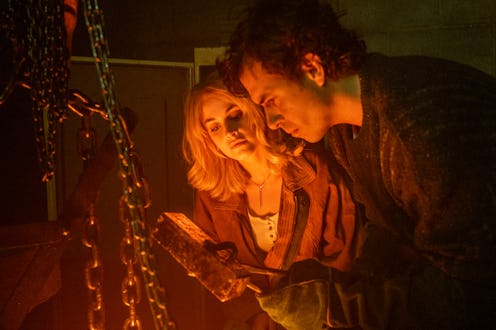Streaming
The True Story Of The 1983 Brink's-Mat Robbery, Explained
Paramount+’s The Gold dramatizes what was once the largest theft in history.

The six armed men who broke into the Brink’s-Mat security depot near London’s Heathrow Airport on November 26, 1983, inadvertently stumbled upon something unexpected: three tons of gold bullion. The real story of what began as a “typical Old Kent Road armed robbery” inspired Paramount+’s The Gold, which first aired in the UK on the BBC and premiered stateside via the streaming service on Sept. 17.
In addition to dramatizing what was then the largest theft in world history, the series also highlights the crime’s wider legacy. The disposal of the bullion “caused the birth of large-scale international money laundering; provided the dirty money that helped fuel the London Docklands property boom; united blue- and white-collar criminals; and left controversy and murder in its wake,” according to the streamer’s description.
The six men involved in the real 1983 Brink’s-Mat heist planned on stealing just over a million dollars in foreign cash, but the bullion and diamonds they found were valued at over $32 million at the time, or about $124 million today. Led by Micky “The Nutter” McAvoy (played by Adam Nagaitis in The Gold) and Brian “The Colonel” Robinson (Frankie Wilson), the gang infiltrated Unit 7 of the Brink’s-Mat warehouse near Heathrow with the help of a security guard, Anthony Black, who was in on the operation, and they forced the other security guards to open the vault. The unexpected haul took hours to load into their van, but the group escaped before police were alerted to the robbery at around 8:30 that morning.
Once the men absconded with the gold, though, they had no idea how to turn the bullion into cash quietly, so they enlisted one of Britain’s most notorious criminals, Kenneth Noye (Jack Lowden). He and his associates, including John “Goldfinger” Palmer (Tom Cullen), reportedly combined some of the gold with copper to disguise it, and detectives later found 11 gold bars wrapped in cloth in a drainage trench at Noye’s former Kent home. Before he was eventually imprisoned for helping to launder some of the cash, Noye fatally stabbed an undercover detective at his home, but was cleared of charges after pleading self-defense.
The downfalls of the robbers and their accomplices began just one month after the theft when Black, who was Robinson’s brother-in-law, confessed to police that he’d provided secret details that allowed them to gain entry to the warehouse. Despite his confession, Black was sentenced to six years in prison for his role in the theft. Ten days after Black implicated them, police arrested McAvoy and Robinson, who were tried together in November 1984. A judge sentenced them both to 25 years in federal prison, but they were released on parole in 2000. Robinson died penniless in February 2021 at age 78, and, after moving to Spain, McAvoy succumbed to cancer at age 71 in January 2023.
The other four robbers were never convicted, but more that 20 people connected to the heist have since been killed, as Britain's criminal underworld turned on itself in an attempt to locate the gold. Other than what authorities recovered near Noye’s home, however, a majority of the gold has never been found. About half of what was stolen is believed to have landed back in the legitimate market, though, and according to the BBC drama, “If you have bought gold jewelry in Britain since 1984, it is likely to contain traces of the Brink’s-Mat gold.”